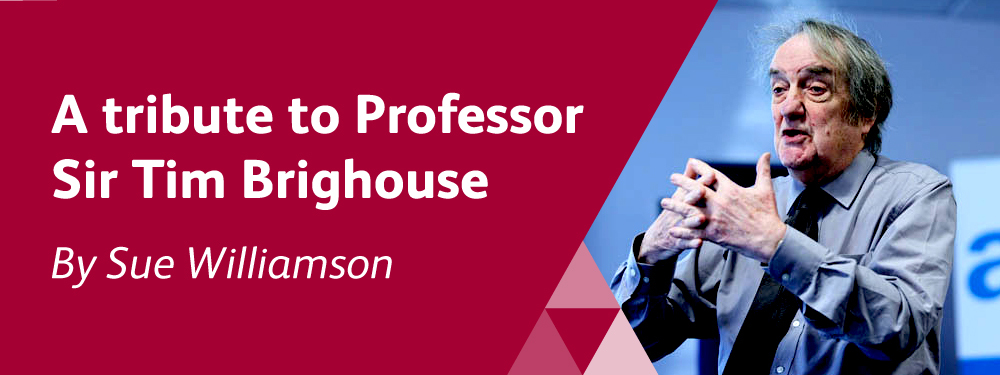
I was very sorry to hear of the death of Professor Sir Tim Brighouse on 15 December 2023. I had the privilege of working with Tim when he was in Birmingham. The headteachers admired and loved him. He had joined Birmingham from Oxford, and his employers were concerned when he failed to turn up in the education offices on his starting date. A few days later, Tim did arrive at his office, and was asked why he hadn’t started work. His response said everything about Tim – “I did start work – I’ve been visiting schools.” It was no wonder that the headteachers supported him so strongly when Chris Woodhead and Ofsted criticised Birmingham schools and the local authority.
Later Tim was appointed to lead on the London Challenge and again we were privileged to work with him. He was always a popular choice to speak at our National Conference and other events. He knew what was important in education; he understood school improvement; he inspired school leaders and teachers; and he developed great teams to support his work. In 2019, I talked to him about SSAT’s work in fighting for deep social justice, and he agreed to write a piece for our pamphlet on Deep Leadership for Social Justice – in the section on System Change, Tim examined how the role of government has changed and the impact upon education. His thesis was that “the product of almost 50 Education Acts since 1980 had been to centralise power at the expense of local government and in some important respects, the schools”. Tim argued that “we need to reverse centralisation and consider how cross-party agreement about the desirability of ‘equality of opportunity’, ‘equity’, and ‘social mobility’ might best be realised.”
Tim wanted a new age of hope and ambition. He advocated for statutory Standing National Education Advisory Council (SNEAC) to limit the powers of the secretary of state. “This would advise variously on the national aims and values underpinning our public schools and on national decisions affecting curriculum, exams and accountability, as well as school admissions. It should be representative of teacher and other staff unions, HMI, Chartered College of Teachers, Universities, CBI and Chambers of Commerce, TUC, the Local Government Association (LGA) and bodies representing Churches and Faiths. Its chair should be appointed by the Select Committee for five-year terms. Select Committee and HMCI’s reports would be considered by SNEAC and advice given to the secretary of state annually.” One of the first tasks of SNEAC should be to consider new accountability arrangements – what should be determined nationally, what regionally and what locally.
Below you will find an extract from Sir Tim Brighouse’s contribution to Deep Leadership for Social Justice. The changes are pitched in the order of accountability, exams and tests, and finally and more extensively curriculum because one of the consequences of the second age of markets managerialism and centralisation is that making schools accountable dominates both firstly assessment and then inevitably curriculum.
“Recently the schools minister, in defending the forthcoming contentious introduction of mandatory baseline assessment as children enter schooling, admitted that it was being implemented not to help individual children but to hold schools accountable by comparing baseline assessment with results of SATs at age 11. Since a lack of accountability was an undoubted weakness of the first post-war age of ‘trust and optimism’, accountability is rightly unavoidable. I stick to that order i.e., tests, exams and curriculum following accountability; but I hope the reforms suggested here will lead to a better balance among the three.
Accountability (1): background and the need for reform – changing Ofsted’s role
At present, accountability functions both to facilitate the operation of the market and to identify blame. The easiest way to hold schools accountable is to find things that are measurable, such as results in externally marked tests and exams where candidates regurgitate memorised knowledge, and some easily assessed skills. If the knowledge, skills, attitudes or values are not susceptible to relatively simple uncontested examination, then not only government but the school and its pupils, which get judged on the published exam and test results, tend to regard them as of second order importance. School improvement is important but tends to be measured by what is measurable – namely exam and/or test results. Curriculum has taken a back seat, until now. It was only in the 1980s that accountability, which was signalled as a concern in Callaghan’s Ruskin speech in 1976, started to gain national prominence. Oxfordshire in 1979 introduced a systematic school self-evaluation process where schools were required to give a four-yearly account of their activities involving a self-chosen peer headteacher, reporting outcomes to their governing body and a panel of the education committee. It was an initiative taken to head-off more punitive possibilities as the council had decided to require the publication of exam results ‘in order that parents could make a better choice of school’. Other LEAs required a more tick-list self-evaluation; yet others renamed their advisory services to schools an ‘inspectorate’. At the time HMI (Her Majesty’s Inspectors) did not publish inspection reports on schools, which were themselves very rare since HMI were engaged on survey work leading to publications which, with HMI-run conferences, influenced schools’ practice and informed the basis of their advice to secretaries of state.
Accountability arrangements for schools changed radically in 1992 when Ofsted was created and regular schools’ inspections with rankings –started, with school exam and test results published nationally in league tables from 1993. While at first Ofsted considered broader aspects of school life, they soon focused more narrowly on pupil outcomes. Poor exam or test results in practice correlated to their placement in the Ofsted ratings of ‘outstanding’, ‘good’, ‘requires improvement’, and ‘inadequate’. It wasn’t until late 2018 that HMCI Amanda Spielman identified Ofsted’s role in the distorting and narrowing impact on the curriculum and changed the school inspection framework from September 2019 in order to encourage schools to consider the wider 27 SYSTEM CHANGE aspects of schools’ purposes and to demonstrate their curriculum thinking. While this is to be welcomed, it needs to be complemented by other reforms to examinations and the accepted means of assessment, which have always influenced schools’ curriculum practice.
The first post-war age of optimism and trust was too relaxed on issues affecting accountability, examinations tests, school improvement and curriculum. But the latest period of centralism, markets and managerialism has been too tightly prescriptive. One of the first tasks of the ‘Standing National Education Advisory Council’ to the secretary of state should be to consider appropriate arrangements for new accountability arrangements – what should be determined nationally, what regionally and what locally. There should be a shift from national to regional and local, and a redefinition of the role of Ofsted to carry out national surveys with an emphasis on advice to the secretary of state on the one hand and to the regions and local authorities on the other. (Ofsted would inspect individual schools only when requested to do so by the regional body.) At the regional and local level, the use of scrutiny committees will be vital. The local and regional bodies should be held accountable by the secretary of state for their performance in providing educational services (including national inspection and accreditation of those services) and for how well they inspire the schools and then hold the schools accountable locally and regionally for ever improved outcomes. The secretary of state would be aided in doing so by Ofsted inspections of regions.
Tests and examinations
The use of externally set and marked tests and exams at once limits what can be used in accountability measures as well as what can be tested or measured. It tends to favour the testing of what can be easily measured in this way. So far as curriculum is concerned, knowledge and a small if vital range of skills are easily within its compass. But values and attitudes tend to be overlooked – as does any assessment of what might be called the education of the spirit as opposed to the mind. And as people acknowledge, even the assessment of the mind is restricted in the scope of our existing exam system, relying as it does so much on paper, pen and recall of an arbitrary set of information. Rather, it should embrace the possibilities offered (and demanded in later life) of computer-based uses of easily available information and the skills required both to navigate the reliability of that information and to use it creatively.
The question is, how can we change our existing unnecessarily burdensome, centralised and costly system which is so unfit for purpose?
Keeping track of national, regional and local standards could easily be ascertained through random sample testing. There is a precedent for this both historically through the short-lived Assessment of Performance Unit (APU) and presently through OECD’s PISA and various other international tests of literacy and maths (eg, PIRLs and TIMMS).
We could then replace tests and exams (for the school pupil and as part of new arrangements for school accountability purposes) by setting tests nationally, marking at school level, moderating locally and regionally. A regional university and the regional body of employers could jointly supervise arrangements and validate their reliability and integrity. Once again it is suggested that the exact detail should be determined after advice from SNEAC.”
I was re-reading Tim’s ideas at the time of Ruth Perry’s inquest and the anger at the role of Ofsted. I have always liked Tim’s idea of Ofsted providing advice to secretary of state and not inspecting individual schools unless requested to do so. My concern was that the regional and local scrutiny committees might provide Ofsted type-stress, but Tim’s recommendations around tests and examinations and a balanced school scorecard provide a much better system for judging school effectiveness. Now is the time to revisit these proposals to honour the memories of Ruth Perry and Tim Brighouse.
Do read Tim’s ideas in Deep Leadership for Social Justice and let me know what you think. Should we have an event to discuss these ideas and make proposals to all the political parties? Email your thoughts to hello@ssatuk.co.uk.

